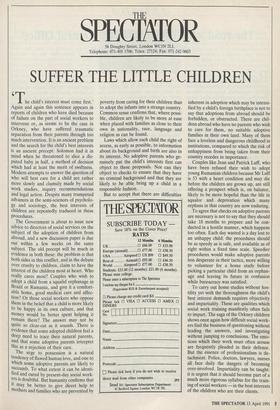56 Doughty Street, London WCIN 2LL
Telephone: 071-405 1706; Telex: 27124; Fax: 071-242 0603
SUFFER THE LITTLE CHILDREN
The child's interest must come first.' Again and again this sentence appears in reports of children who have died because of failure on the part of social workers to intervene or, as seems to be the case in Orkney, who have suffered traumatic separation from their parents through too much intervention. It is an ancient problem and the search for the child's best interests is an ancient precept: Solomon had it in mind when he threatened to slice a dis- puted baby in half, a method of decision which had at least the merit of swiftness. Modern attempts to answer the question of who will best care for a child are rather more slowly and clumsily made by social work studies, inquiry recommendations and legal action. Despite many trumpeted advances in the semi-sciences of psycholo- gy and sociology, the best interests of children are repeatedly traduced in these procedures.
The Government is about to issue new advice to directors of social services on the subject of the adoption of children from abroad, and a new discussion paper is due out within a few weeks on the same subject. The old precept will be much in evidence in both these: the problem is that both sides in this conflict, and in the debate over cruelty to children, claim to have the interest of the children most at heart. Who really cares most? Couples who wish to adopt a child from a squalid orphanage in Brazil or Rumania, and give it a comfort- able home, good medical care and affec- tion? Or those social workers who oppose them in the belief that a child is more likely to be happy in its own culture, and that money would be better spent helping it remain there? The answer may not be quite so clear-cut as it sounds. There is evidence that some adopted children feel a deep need to trace their natural parents, and that some adoptive parents interpret this as a rejection of their care.
The urge to possession is a natural tendency of flawed human love, and one to which some adoptive parents are likely to succumb. To what extent it can be identi- fied and cured by present-day social work- ers is doubtful. But humanity confirms that it may be better to give direct help to mothers and families who are prevented by
poverty from caring for their children than to adopt the infants into a strange country. Common sense confirms that, where possi- ble, children are likely to be more at ease when placed with families as close to their own in nationality, race, language and religion as can be found.
Laws which allow each child the right of access, as early as possible, to information about its background and birth are also in its interest. No adoptive parents who ge- nuinely put the child's interests first can object to these proposals. Nor can they object to checks to ensure that they have no criminal background and that they are likely to be able bring up a child in a responsible fashion. But to accept that there are difficulties inherent in adoption which may be intensi- fied by a child's foreign birthplace is not to say that adoptions from abroad should be forbidden, or obstructed. There are chil- dren abroad who have no parents who wish to care for them, no suitable adoptive families in their own land. Many of them face a loveless and dangerous childhood in institutions, compared to which the risk of unhappiness from being taken from their country recedes in importance.
Couples like Jean and Patrick Luff, who have been refused their wish to adopt young Rumanian children because Mr Luff is 53 with a heart condition and may die before the children are grown up, are still offering a prospect which is, on balance, likely to be more hopeful than the life in squalor and deprivation which many orphans in that country are now enduring.
To agree that checks on adoptive parents are necessary is not to say that they should take 18 months to prepare and be con- ducted in a hostile manner, which happens too often. Each day wasted is a day lost to an unhappy child: the procedures should be as speedy as is safe, and available as of right within a fixed time scale. Speedier procedures would make adoptive parents less desperate in their tactics, more willing to volunteer for a home study before picking a particular child from an orphan- age and leaving its future in confusion while bureacracy was satisfied.
To carry out home studies without hos- tility yet with the thoroughness the child's best interest demands requires objectivity and impartiality. These are qualities which social work training manifestly often fails to impart. The saga of the Orkney children shows once again how difficult social work- ers find the business of questioning without leading the answers, and investigating without jumping to conclusions. The emo- tions which their work must often arouse are frequently pleaded in their defence. But the essence of professionalism is de- tachment. Police, doctors, lawyers, nurses all face daily the dangers of becoming over-involved. Impartiality can be taught: it is urgent that it should become part of a much more rigorous syllabus for the train- ing of social workers — in the best interests of the children who are their clients.


























































 Previous page
Previous page